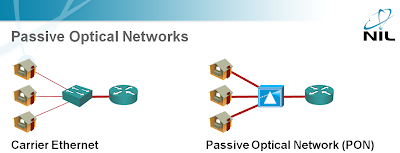Category: optical
Plexxi PSI: MAU at Gigabit Speed
Regardless of the advantages of photonic switching (David Husak claims it’s 20.000 times more effective than electronic switching), the programmable optical components remain ludicrously expensive, prompting Plexxi to launch a cost-optimized fixed-topology version of their data center products.
The Plexxi Challenge (or: Don’t Blame the Tools)
Plexxi has an incredibly creative data center fabric solution: they paired data center switching with CWDM optics, programmable ROADMs and controller-based traffic engineering to get something that looks almost like distributed switched version of FDDI (or Token Ring for the FCoTR fans). Not surprisingly, the tools we use to build traditional networks don’t work well with their architecture.
In a recent blog post Marten Terpstra hinted at shortcomings of Shortest Path First (SPF) approach used by every single modern routing algorithm. Let’s take a closer look at why Plexxi’s engineers couldn’t use SPF.
Plexxi’s Dan Backman Presenting in the Data Center Fabrics Update Webinar
Plexxi has a really interesting data center fabric solution that combines CWDM optics with L2+L3 switching. They briefed me on their product just before their public launch; I like their approach, particularly the combination of robust traditional forwarding with controller-based network optimization that you can influence from the outside, but somehow I never quite found the time to blog about them … although I did manage to solve the hard part of the problem: write a Perl script that generates Graphviz graph description to generate schematics of their CWDM inter-switch links.
Traffic grooming in optical networks
 SearchTelecom has just published my new article: Traffic grooming in optical networks: Making real-world choices. If you’re new to the optical networking (or if you’ve been bedazzled by vendors’ marketing departments), you’ll probably find it a useful introductory text.
SearchTelecom has just published my new article: Traffic grooming in optical networks: Making real-world choices. If you’re new to the optical networking (or if you’ve been bedazzled by vendors’ marketing departments), you’ll probably find it a useful introductory text.
As the production-grade all-optical traffic grooming solutions don’t exist yet, the only short answer anyone (apart from people trying to sell you specific gear) can give you on this topic is “it depends”. You have to evaluate your needs, do several alternative designs, and find the design that best fits your needs, your budget and your long-term cost expectations.
Passive Optical Networks
When I’ve first heard about Passive Optical Networks, this blast from the past almost made my head explode. Imagine this: you’re replacing obsolete copper cabling with fiber and decide to create shared media access network similar to the widely hated cable networks.

The only benefit of PON networks that I can see is that it only needs passive equipment at the concentration point. My list of drawbacks is huge, ranging from security concerns to service evolution. What’s your opinion? Would you like to correct my bearing?
IP over DWDM
A while ago I was pushed (actually it was a kind nudge) into another interesting technology area: optical networks, with emphasis on IP over DWDM. I realized almost immediately that I’d encountered another huge can of worms. A few issues you can stumble across when trying to plug routers or switches directly into DWDM networks are documented in my IP over dense wave division multiplexing (DWDM): Metro and core issues article recently published by SearchTelecom.com.
